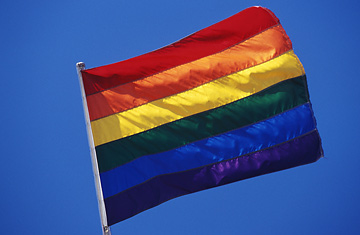
When Heather Gillman, a normally reserved junior at Ponce de Leon High School in the Florida Panhandle, found out that her openly lesbian cousin, a ninth grader, had been suspended, along with 10 other students, for expressing support of a lesbian senior who claimed to have been harassed, the straight 17-year-old was outraged. Gillman responded to the suspensions - and the claim that the students had committed "illegal organizing" - by wearing a rainbow T-shirt and her cousin's rainbow belt to school. But soon after, when the school board prohibited expressions supporting equal rights for gay people at the school, Heather's mother, Ardena Gillman, decided more serious action was called for. She talked to the local branch of the American Civil Liberties union, which pursued the case on the grounds that Gillman's First Amendment rights were being violated. This week, in a two-day trial that resulted in a rare, immediate ruling from the federal bench, Gillman won her suit against the Holmes County school district.
Christine Sun, a senior staff attorney for the ACLU, credits the easy win largely to school principal David Davis, who had not exactly hidden his bias. He was reported to have asked a bullied student if she was gay; told her homosexuality was wrong; and forbidden her from wearing a pink breast cancer awareness bracelet that he alleged was a gay pride accessory. Though school board superintendent Steve Griffin denies Davis told the student homosexuality was wrong, calling it a "rumor that the kids took off running with," Davis did tell the court that rainbows and T-shirts with messages such as "God loves me the way I am" called to mind images of gay people having sex. He also conceded during the trial that he would allow students to promote the image of the Confederate flag at school because, in contrast to the rainbow images, he did not foresee the flag creating a "disruption."
As for the supposed chaos that was to ensue if students were permitted to express themselves, so far there has been none. On Wedneday Heather wore a shirt to school that said "Gay? Fine by me." Others donned rainbow bracelets and shirts with messages like Got Pride? and Whatever! (under a group of rainbow colored people)."I was definitely worried about how teachers would not like me afterward," says Gillman, "but mostly the reaction has been very positive."
The legal victory was just the latest for increasingly visible gay and lesbian students (and their supportive straight friends) over the last decade. Gay straight alliances (GSAs) - extracurricular clubs that promote safety and tolerance in school - have grown from 200 in 1998 to more than 4,000 today. And students have won the right of GSAs to exist in more than a dozen court battles, even in relatively conservative regions like Salt Lake City, Utah and Orange County, Calif.
In the Gillman case, U.S. District Judge Richard Smoak specifically chastised the board for a missed educational opportunity on "leadership...civil discourse...and tolerance and diversity." But the players on both sides may have learned some lessons nonetheless. Griffin, who says he just "didn't think expressions about that lifestyle were appropriate in the school setting," acknowledged that "times are changing" and said he'll comply with whatever the court orders. Ardena Gillman, who didn't think her shy daughter would ever go through with a trial, learned Heather was "not your typical teenager." As for Heather, the experience was a powerful firsthand lesson in civics. After winning the case, she scrapped her long-held plans to become a flight attendant after high school. Now, she says, "I'm going to college."
